Related Research Articles

Swami Haridas (1480—1573) was an Indian spiritual poet and classical musician. Credited with a large body of devotional compositions, especially in the Dhrupad style, he is also the founder of the Haridasi school of mysticism, still found today in North India. His work influenced both the classical music and the Bhakti movements of North India, especially those devoted to Krishna's consort Radha. Hit Harivansh Mahaprabhu, Hariram Vyas, Rupa Goswami, Vidyapati, Mahaprabhu Vallabhacharya, Vitthalnath (Gusainji), were his contemporaries.

Pandit Bhajan Sopori was an Indian instrumentalist. He was a player of the santoor, an ancient stringed musical instrument.

The Wadali Brothers – Puranchand Wadali and Pyarelal Wadali – are Sufi singers and musicians from Guru Ki Wadali in the Amritsar District in Punjab, India. Pyarelal Wadali, the younger of the two died on 4 March 2018 at the age of 75 due to cardiac arrest at the Fortis Escorts Heart Institute, Amritsar.

Lalith J. Rao is an Indian classical singer and a representative of the Agra gharana.
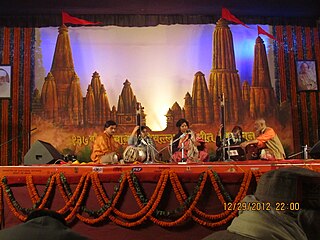
Harballabh Sangeet Sammelan is the oldest festival of Hindustani Classical Music in the world, which is celebrated every year at the sacred seat of music, the samadhi of Baba Harballabh – a saint and an exponent of Hindustani Classical Music. The first Sammelan was held in 1875 at the Sidh Peeth-Shri Devi Talab, in Jalandhar. Since then it has been held every year.
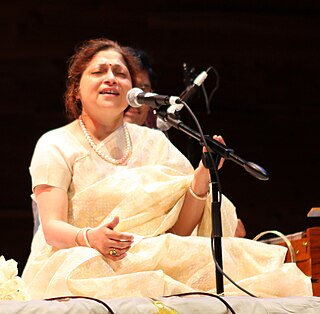
Tripti Mukherjee is an Indian classical vocalist. She belongs to Mewati gharana. She is the founder and director of the Pandit Jasraj Institute for Music, Research, Artistry and Appreciation in New York.
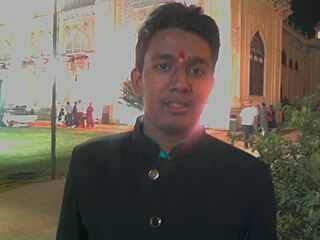
Baba Bhaskar Nath is an Indian classical instrumentalist. He plays the Shehnai belonging to Meerut Shehnai Gharana. He is a child prodigy.
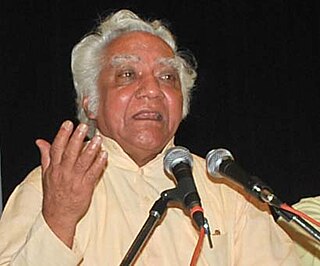
Pandit Yashpaul was an Indian classical singer belonging to the Agra gharana.

Abdul Sattar Khan, popularly known as Ustad Tari Khan, is a Pakistani tabla player and vocalist. Tari Khan hails from the Punjab gharana and is the student of Ustad Miyan Shaukat Hussain. He has been awarded with many accolades such as Taj Poshi, the Hazrat Amir Khusrow Award, as well as Pakistan's Pride of Performance Award in 2008. Tari Khan belongs to the tabla playing gharana called the Punjab gharana. Today, he is acknowledged as one of the foremost Tabla players of all time by musicians all over the world.
Upendra Bhat is a singer of Hindustani classical music, from the Kirana Gharana, who reminds the listeners of his legendary Guru – Pandit Bhimsen Joshi.
Sanhita Nandi is a prominent Hindustani classical vocalist of the Kirana Gharana. The central motif of her style is slow tempo raga development and ornamented sargams. She is getting guidance under Mashkoor Ali Khan.

Shanno Khurana is a noted Indian classical vocalist and composer, from the Rampur-Sahaswan gharana of Hindustani classical music. A disciple of the doyen of the gharana, Ustad Mushtaq Hussain Khan, she is known for performing rare bandish and raag, though her singing style includes genres like khayal, tarana, thumri, dadra, tappa, to chaiti and bhajan. Born and brought up in Jodhpur, she started singing on All India Radio in 1945 in Lahore, later shifted to Delhi, where she continued her singing on All India Radio, Delhi and in concerts and music festivals. She also pursued music education, finally earning her M.Phil. and PhD in music from the Kairagarh University, and has undertakes extensive research on folk music of Rajasthan.
Swami Haridas Sangeet Sammelan is a noted Hindustani classical music and dance festival organized by Sur Singar Samsad, and held annually in Mumbai, India. All the prominent Indian classical vocalists, instrumentalists and dancers perform at the week-long festival.

Kamala Bose (Bengali) (1947–2012) was a prominent Indian classical vocalist.

Pandit S. Ballesh Bhajantri is a popular Indian classical Hindustani shehnai player. He is a disciple of shehnai player Ustad Bismillah Khan, he is benares gharana shehnai player and a patiala gharana hindustani vocalist, ghazal singer, Indian playback singer and musician, Ballesh is credited with popularizing the shehnai, a reeded woodwind instrument. He is also a Prasar Bharati's All India Radio (AIR) and Doordarshan artist.

Aarti Nayak-Kamath is an Indian Hindustani classical music vocalist working in the Gwalior gharana tradition. She has also performed in Sangeet Natak musical drama.
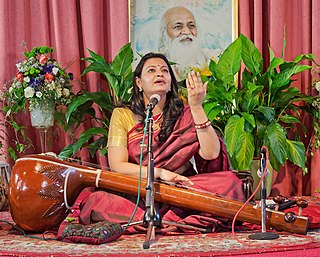
Meeta Pandit is a Hindustani Classical vocalist and a leading exponent of the Gwalior Gharana. She is the granddaughter and disciple of Krishnarao Shankar Pandit and daughter of Laxman Krishnarao Pandit. She is the sixth in the unbroken lineage and the first woman in the family to have taken up music as a profession.

Shashwati Mandal is a Hindustani classical music vocalist. She is an exponent of the Gwalior gharana.

Lokesh Anand is an Indian shehnai player. Lokesh has been learning under Sangeet Martand Pandit Jasraj, Hence belongs to Mewati Gharana. He is empanelled with the Indian Council for Cultural Relations. The key characteristics of Anand's Shehnai playing are neat fingering techniques, command over tempo along with richness and clarity in sound. Lokesh performs solo and in duet and also does fusion.
References
- ↑ "Shri Baba Harballabh Sangeet Mahasabha". punjabtourism.gov. Archived from the original on 14 March 2012. Retrieved 24 June 2013.
- 1 2 3 "Harivallabh". Harivallabh.org. Archived from the original on 28 March 2013. Retrieved 24 June 2013.
- 1 2 3 "What Is Harballabh Sangeet Sammelan". www.thisday.app. Retrieved 4 December 2023.